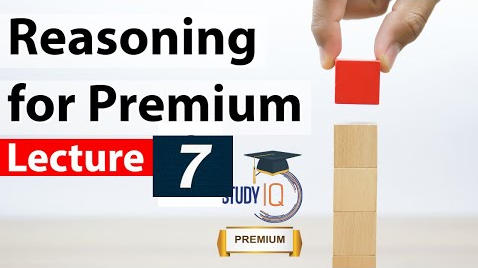Table of Contents
Statement:
- A = B > U ,
- R < S ≤ U ,
- S = O = L
Conclusion:
- R < A
- L = B
- L < B
Statement:
- M ≥ C > D,
- Y < F = C,
- H ≤ J < F
Conclusion:
- M > H
- Y = J
- Y < D
Statements:
- All bags are books.
- All pens are bags.
- All parcels are pens.
- No books is a pencils.
Conclusions:
- No bag is a pencil
- All parcels are books
- At least some books are pens
- All pencils being parcels is a possibility
Seven persons i.e. X, Y, A, C, M, D and S are sitting in a row such that all are facing in the north direction, who among the following sits on the right end of the row?
- Statements I. D sits third to right of Y. One of the immediate neighbour of D sits fifth to the right of M. S sits second to the right of A. Neither X nor C sits at the end of the Neither X nor C are the immediate neighbours of each other.
- Statements II. Y sits third to the left of D and both does not sit at the end of the row. S sits fourth to the right of A and one of them sits at the end of the row. C sit third to the right of X. M is not the immediate neighbour of D.
36 Students are standing in a straight line. A, B, C, D and E are five friends among them.
How many students are standing between B and D?
- Statement l. There are 8 students between B and E and 16 students between C and D. E is 15th from the left.
- Statement ll. B is not standing to the right of A. C is 11th from the left and A is 16th from the right.
Eight Friends (P, Q, R, S, T, U, V and W) are sitting in a circle some of them are facing the outside and some are inside.
Who is sitting 3rd to the left of Q?
- Statement I: S and T sit opposite to each other. Immediate neighbors of S are Q and V. Q sits 3rd to the right of T. Both neighbor of T facing outside.
- Statement II: T sits 3rd to the right of Q, who sits 2nd to the right of V, who sits immediate left of W, who sits 4th to the right of U. S sits 3rd to the right R
Seven students A through G lives in a hostel having seven rooms stretched along a straight line from left end to right end.
They have different rooms number ranging from 1 to 10 (including 1 and 10) not particularly in any order. No students having names in English Alphabetical order sits together.
The student who has his name beginning from a consonant doesn’t lives at the middle. G’s room number is greater than B’s. D lives second to the right of F, who do not live right of A. G lives at the right end and the student living in room number 5 lives adjacent to him. C lives in room number 4. The sum of room number of D and F is 10. A’s room number is least. The difference between A’s room number and B is 8. The sum of two adjacent room numbers is not an even number.
Maths/Reasoning | Free PDF






















 WhatsApp
WhatsApp